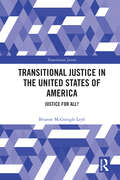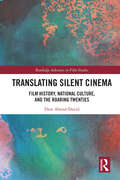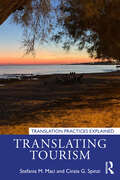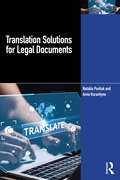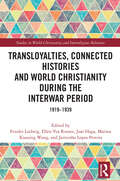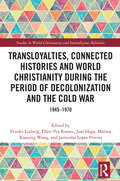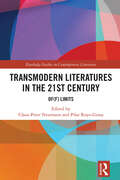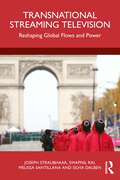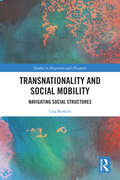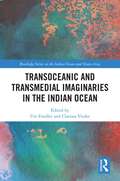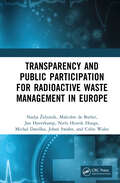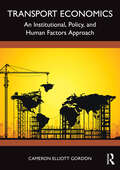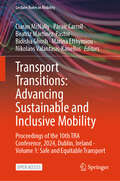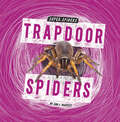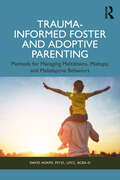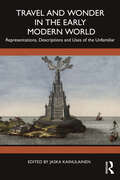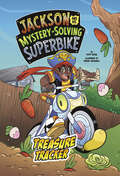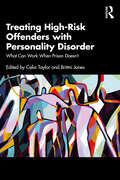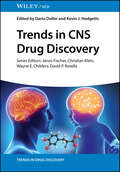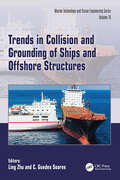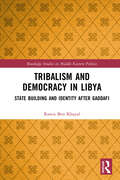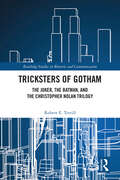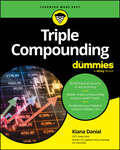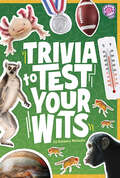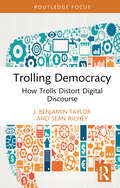- Table View
- List View
Transitional Justice in the United States of America: Justice for All? (Transitional Justice)
by Brianne McGonigle LeyhThis book employs a transitional justice lens in order to explore justice initiatives in the United States of America.Transitional justice developed out of societal demands to better address serious abuse, injustice, and atrocities – initially in South American post-authoritarian contexts transitioning to democratic states and later elsewhere, but especially within post-conflict contexts. The lens of transitional justice has only rarely been extended to the United States and never in a comprehensive way. This book aims to provide a contemporary and critical analysis of relevant developments and debates within the United States related to transitional justice. Using the framework of the five main ‘pillars’ of transitional justice – truth, reparation, accountability, guarantee of non-repetition, and memory – the book identifies and explores relevant justice initiatives, both historical and contemporary, across federal, state, and local levels in the United States. The empirical examples taken up show how a broad array of civil society actors are driving transitional justice processes across the country. By recognizing both extraordinary and ordinary justice processes as transitional justice, the book offers a broader understanding of how groups navigate transitions to more democratic, peaceful, and socially just societies. The examples further shed light on the expansion of the field to nontraditional contexts, the relationship between global norms and local practices, and the role of law and political compromise. The book concludes by emphasizing the value and power of the plurality of initiatives taking shape across the United States but calls for a more coherent transitional justice policy at the national level.This book is relevant for scholars and students with interests in transitional justice, conflict resolution, human rights, Indigenous studies, culture, and race.
Translating Silent Cinema: Film History, National Culture, and The Roaring Twenties (Routledge Advances in Film Studies)
by Dror Abend-DavidTranslating Silent Cinema examines closely the translation, adaptation, and reception of three silent films in English, German, and Yiddish to argue that the study of film translation should extend beyond textual translation to a wide selection of primary materials and the consideration of social, economic, cultural, and historical contexts.Close readings of Der Kaufmann von Venedig [The Merchant of Venice] (1923), Das alte Gesetz [The Ancient Law] (1923), and Ost und West [East and West] (1923) raise a theoretical question: Can we discuss films in the same way that we discuss theater productions, regarding each individual screening as a performance, and compose a “performance history” of different films? As no two film screenings are the same, the author highlights the importance of a multidisciplinary approach to translation that combines insights from film studies, translation studies, and cultural and historical contexts. Furthermore, in linguistic comparison and in the study of the reception of the films in each language, this book argues that each film is the subject of very different receptions under very different circumstances. It also analyzes the relevance of films that were made in Austria and in Germany during the 1920s on Jewish themes to a contemporary debate about immigration, racism, and discrimination.This book’s pioneering analysis of the study of film translation encompasses a wide context of multiplicity of ideologies, economic interests, and historical contexts. It will be of interest for readers in translation studies (particularly in audiovisual translation), film studies, German studies (and German cinema), and Jewish studies (and cinema).
Translating Tourism (Translation Practices Explained)
by Stefania M. Maci Cinzia G. SpinziThis engaging textbook provides an in-depth examination of tourist discourse and communication and a guide to translating tourism texts. Through analysis of the linguistic, intercultural, and socially inclusive aspects of tourist communication, this volume covers both conventional and digital forms of tourist texts and explores the unique attributes of tourist discourse, including its lexical, syntactic, and textual qualities, and how these affect translation processes. Special emphasis is placed on the translation of digital tourist information, guided tours, and accessible tourism discourse, highlighting the need for a functional and flexible translation methodology. The authors posit that tourist translation transcends simple language transmission, functioning as a mediatory act that necessitates cultural adaptation, knowledge of accessibility, and persuasive methods customised for varied audiences.Synthesising concepts from tourist studies, discourse analysis, and translation studies, this accessible textbook merges theoretical views with practical examples to provide a key resource for researchers, translators, and professionals in translation studies, tourism communication, English language and linguistics.
Translation Solutions for Legal Documents
by Nataliia Pavliuk Anna KurashynaThis textbook covers legal translation themes by types of legal documents. The three parts of the book are devoted to the translation of legislative documents, contracts, and court documentation. This textbook uses a new approach to train students of legal translation, which can be used to teach translation from English to any other language. This approach combines legal and linguistic perspectives of the study of legal documents, and includes machine translation and artificial intelligence (AI) tools and corpus methods. The book instigates a profound understanding of the functions, structure, and linguistic characteristics of document types. Examples of translation from English to Italian, German, Ukrainian and Polish with analysis will help students compare different translations and suggest their own translation of the same examples into their target language (TL). The book also provides exercises to develop translation skills within the legal domain, focusing on developing students’ research skills, their ability to substantiate the choice of target language terminology, identify translators' false friends, cope with the issues of syntax and morphology, and apply various translation strategies and techniques. The exercises also include a comparative analysis of post-editing of machine translation and AI-generated translations with their own translations.
Transloyalties, Connected Histories and World Christianity during the Interwar Period: 1919-1939 (Studies in World Christianity and Interreligious Relations)
by Ellen Vea Rosnes Joar Haga Frieder Ludwig Jairzinho Lopes Pereira Marina Xiaojing WangThis book introduces the approach of “transloyalties” to study “connected histories” in World Christianity. The term “transloyalties” is used to analyze the multifaceted processes in various contact zones through which cultural and religious identities were transformed in the tension between different loyalties. The volume tests this approach in various case studies, most of them focusing on Lutheran churches and “World Lutheranism” between 1919 and 1939, a time of rapidly changing political circumstances.Traditionally, the United States, Germany, and Scandinavia had been identified as the three centers of Lutheranism. However, while the structures in these centers were well established and “World Lutheranism” was something “out there,” with limited impact back home, negotiation processes on “Lutheran identity” were crucial in contexts where new Lutheran churches emerged. Asian and African church leaders operated in a new context of loyalties: They pushed for cooperation, and they often interacted with mission organizations from all three centers, and also with other religions, traditional cultures, and political movements. Therefore, it is significant what happened, for instance, in the Lutheran Church of China or at Umphumulo in South Africa.Including theoretical reflections and case studies, this volume is valuable reading for scholars of the history of World Christianity.
Transloyalties, Connected Histories and World Christianity during the Period of Decolonization and the Cold War: 1945-1970 (Studies in World Christianity and Interreligious Relations)
by Ellen Vea Rosnes Joar Haga Frieder Ludwig Jairzinho Lopes Pereira Marina Xiaojing WangFocusing on the history of World Christianity, this book relates the concept of “transloyalties” to developments during the “Period of Decolonization and the Cold War.” This was a time when the terms “loyal” and “loyalty” became more frequently used, not only in the United States, where a “loyalty program” was introduced but also in Africa, Asia, and Europe. Churches and ecumenical organizations had to navigate in this context of new loyalty demands. They had to clarify whether changes in church/ state relations and corresponding changes in their organizational structures were necessary, or whether they affected core identities. Was the restriction or exclusion of Western missionaries a threat to the universal character of the church or a transition to self-governing churches? How did African and Asian churches relate to Western mission societies in the new context? Was the strive for justice a basis for cooperation with socialist governments, or were the concepts fundamentally different? How were denominations organized at a national level? Which forms of church government were chosen? Which denominations could become members of Christian Councils that represented joint interests toward the states? These are some of the questions that underlie the importance of this volume to the study of the history of World Christianity.
Transmodern Literatures in the 21st Century: Of(f) Limits (Routledge Studies in Contemporary Literature)
by Claus-Peter Neumann Pilar Royo-GrasaTransmodern Literatures in the 21st Century: Of(f) Limits offers an in-depth examination of how transmodern literatures in English over the last two decades have addressed the phenomenon of the limit. The 14 chapters that make up the volume examine how geographical, racial, ethnical, sociocultural, generical, ontological, epistemological, and other limits are articulated, transgressed, and reconfigured in recent narratives by authors writing in a wide variety of transmodern trends such as Afro- and Africanfuturism, Young Adult feminist science fiction, food fiction, air travel fiction, the networked novel, and future narratives amongst others. They thereby expose and challenge hierarchised binary dichotomies as Euro- and Anthropocentric exclusionary discursive constructs that have kept non-hegemonic voices off limits. To counter the detrimental effects of the neoliberal grand narrative of globalisation, the chapters as well as the narratives of the limit they analyse emphasise an urgent need for inclusiveness, relationality, and communality.
Transnational Streaming Television: Reshaping Global Flows and Power
by Joseph Straubhaar Melissa Santillana Swapnil Rai Silvia DalbenExamining the impact of streaming on the global production and flow of television and film, this book provides an innovative theoretical framework to conceptualize how asymmetric dynamics of power play out in the era of global streaming.This book analyses Netflix and Amazon Prime Video, two tech-based digital native streamers, and compares them to Disney+ and HBO Max (Warner Bros. Discovery), two legacy Hollywood studios with cable TV, and broadcasting operations, now pursuing global streaming. The book compares their different models of operation and specifically explores how these four streamers, particularly Netflix, are co-producing and commissioning television programs and films in an increasing number of countries. It also examines how this trend is creating new opportunities for independent producers and soft power for the producing nations. This book further considers the direct algorithmic targeting of individuals by their genre preferences across boundaries of culture, language, and nation, boundaries that previously protected national and regional television markets, creating a new flow of data colonialism. At a more local level, the book also examines some of the national and regional streaming platforms emerging in some of the key players in the Global South: Brazil, India, and Mexico.This is essential reading for students, researchers and academics interested in media studies, global media, and global television studies.
Transnationality and Social Mobility: Navigating Social Structures (Studies in Migration and Diaspora)
by Lisa BonfertConsidering that changes in people’s life chances are increasingly shaped by cross-border movements and transnational connections, this book proposes a transnational conception of social mobility. Emphasising the manifold ways in which contexts of migration and transnationality affect perceptions and evaluations of betterment, the book argues for linking the study of social and spatial mobility to better capture how people navigate social structures of inequality in a globalised world.Based on the experiences of people who moved to Germany to improve their lives in some way, this book links empirical findings with theoretical considerations from transnational and intersectional scholarship to propose an alternative concept of social mobility that emphasises people’s subjective interpretations of success and failure in their search of betterment.Drawing on the concepts of social spaces, capitals, and reference group theory, a model of the cogwheels of social mobility is proposed to account for the varying ways in which cross-border migration and transnational connections initiate changes in people’s social position within and across country borders.This book will therefore be of interest to scholars of sociology, geography and politics with interests in migration, transnationalism and mobility.
Transoceanic and Transmedial Imaginaries in the Indian Ocean (Routledge Series on the Indian Ocean and Trans-Asia)
by Clarissa Vierke Ute FendlerTransoceanic and Transmedial Imaginaries in the Indian Ocean explores multiple aesthetic relations constantly in flux, which construct, deconstruct, and reconstruct the Indian Ocean. It addresses the questions of how the arts – music, literature, visual art, and performance – relate to and dynamically create imaginaries of the Indian Ocean as a transcontinental space.Contributors focus on the relations and interference of various art forms, including literature, music, visual arts, installations, and performance as well as local crafts, and cross the boundaries of language(s), which have often separated views of the Indian Ocean along the monolingual logic of disciplines. This book takes a transmedial perspective and studies the Indian Ocean as a fluid space, in which languages, images, music, and dance movements have been traveling and influencing each other for centuries. It analyzes how music, verbal, audiovisual, or performative arts use imagery, sound, narrative, and performances to make alternative relations across space and time and to make transoceanic visions and histories perceptible. Focusing on the aesthetic approach, this book combines various formats to capture the complex and often complementary interconnectedness of different stories told using various media, creating different atmospheres and touching other senses.This book is a novel contribution to the study of the Indian Ocean and will be of interest to an interdisciplinary readership, including literature, cultural studies, visual arts, performance, anthropology, and history, but also social geography, linguistics, and music studies.
Transparency and Public Participation for Radioactive Waste Management in Europe
by Nadja Železnik Jan Haverkamp Niels Henrik Hooge Michal Daniška Johan Swahn Colin Wales Malcolm de ButlerTransparency and Public Participation for Radioactive Waste Management in Europe investigates how the pillars of the Aarhus Convention, and a broader understanding of transparency by Civil Society (CS), can be transposed into Radioactive Waste Management (RWM), particularly in the establishment of Radioactive Waste (RW) facilities in different national contexts.With an analysis of nine national cases from Europe, the book provides the results of the investigations, including comments, suggestions, questions, and other observations, collected in interaction with other EURAD-1 participants from civil society. It discusses the feedback provided within a questionnaire completed by ROUTES members for the development of national programmes on radioactive waste management submitted to the waste directive, based on effective access to information, public participation, justice, resources, and transparency.The book will interest nuclear energy policymakers, government employees, and radioactive waste management facility operators. It will also aid researchers and academics investigating public perception and facility siting considerations.
Transport Economics: An Institutional, Policy, and Human Factors Approach
by Cameron Elliott GordonThis book takes an interdisciplinary, institutional, and historically informed approach to the economics of transport, providing a more nuanced and complete understanding of human transport choices, individually and collectively, and the related choice of location, including the formation of cities.The first principles of standard economic theory – referred to here as the core model – are systematically analysed, with a particular focus on the strengths and weaknesses of the simplifying assumptions used. The economic dynamics of modern transport systems are explored in light of theory and practice, covering such topics as the role of incentives, technological change and economic growth, and the enabling role that transport plays in productivity. Many historical and present-day examples are provided to explore the real-world nuance and subtlety that crops up repeatedly in transport activity, using additional disciplinary lenses such as planning, engineering, psychology, and sociology. Overall, the book examines the implications of the unique particularities of human beings, including the quirks of their psychologies and physical bodies, for transport planning, development, and implementation. A focus is kept on the “real world” policy complications that arise so frequently in the transport arena.The book, while aimed at university students, will also appeal with its holistic, thoughtful approach to researchers interested in transport, urban planning, and its effective delivery. Policy-makers and practitioners seeking a broad overview of the field beyond their specialisations will also enjoy this book.
Transport Transitions: Proceedings of the 10th TRA Conference, 2024, Dublin, Ireland - Volume 1: Safe and Equitable Transport (Lecture Notes in Mobility)
by Bidisha Ghosh Marina Efthymiou Ciaran McNally Páraic Carroll Beatriz Martinez-Pastor Nikolaos Valantasis-KanellosThis is an open access book. It gathers the proceedings of the 10th edition of Transport Research Arena (TRA 2024), held on 15-18 April, 2024, in Dublin, Ireland. Contributions cover a wide range of research findings, methodological aspects, technologies and policy issues that are currently reshaping the transport and mobility system in different parts of Europe. Bridging between academic research, industrial developments, and regulations, this book offers a comprehensive review of the state-of-the art in transportation, with a special emphasis on topics concerning digital transition in transport, and inclusive and sustainable mobility alike. This is the first volume of a 6-volume set.
Trapdoor Spiders
by Lisa J. AmstutzThe trapdoor spider is known for being an architect of tunnels. It builds a safe home, hidden from predators. Young readers will delight in learning all about this fascinating spider, including its habitat, body parts, hunting style, and more. Achievable text, stunning photographs, spider jokes, and an activity round out the learning.
Trauma-Informed Foster and Adoptive Parenting: Methods for Managing Meltdowns, Mishaps, and Maladaptive Behaviors
by David AdamsMany foster and adoptive parents lose hope when they experience challenging and oppositional child behaviors. This book gives parents the tools and strategies to respond to these outbursts – particularly those that stem from a child’s potentially traumatic history.Drawing from behavioral research within an attachment and neurobiological framework, this transformative book offers practical guidance for foster and adoptive parents and professionals who seek to better understand and respond to a child with maladaptive behaviors. Based on his clinical expertise and his personal experience of being a foster and adoptive parent, Dr. David Adams highlights how trauma can impact children’s brains and behaviors. With a comprehensive model for each behavior, this guide offers evidence-based strategies that parents can use to both avoid and respond to the most common behaviors including lying, disrespect, hoarding, and defiance. Complete with sample scripts, this book equips readers with the knowledge and tools to become more aware, responsive, and empathetic.This invaluable guide is designed for parents and caregivers of foster and adopted children, as well as family therapists, psychologists, and other mental health professionals who work with these children and their families.
Travel and Wonder in the Early Modern World: Representations, Descriptions and Uses of the Unfamiliar
by Jaska KainulainenThis collection of chapters explores wonder in the context of early modern travel and travel writing, offering multifaceted and novel interpretations of the problematic relationship between a traveller and their unfamiliar environment through various geographical, chronological and thematic lenses.Exploring representations, descriptions and uses of the unfamiliar, the contributors discuss and elucidate rhetorical, epistemological, religious, colonial, materialistic and emotional aspects of wonder in the early modern world. They study European travellers and their texts, as well as descriptions of wonder within the Muslim world and reactions to the unfamiliar reported by Muslim travellers in Europe. The collection ranges from travellers’ descriptions of wonder to an analysis of wonders that have travelled. With its focus on “wonder” in the context of early modern travel, this volume fills a significant gap in research, shedding new light on the history of intercultural encounters and on the processes of learning about the world and our place in it.The book is aimed at both academic and non-academic readers, for experts who study early modern history and travel writing, and for lay readers who are curious about the history of travel and about past conceptions of the world and foreign cultures.
Treasure Tracker
by Scott NickelWhen a mysterious map blows into Jackson’s yard, it could only mean one thing: treasure! In the mystery-filled early chapter book, Jackson and his AI-powered bike, S.C.O.U.T., follow clues from the map through Boreville—from local landmarks to tricky riddles. Could the clues lead to hidden riches or something even more surprising? As the adventure unfolds, Jackson realizes the map may not be what it seems! Full of clever twists and treasure-hunting fun, this exciting mystery is perfect for young readers who love a good quest!
Treating High-Risk Offenders with Personality Disorder: What Can Work When Prison Doesn’t
by Celia Taylor Brittni JonesIndividuals who have personality disorder and commit serious, violent offences present a particular challenge in terms of rehabilitation and risk management. Drawing from the experiences of those working within the Millfields Unit specialist service for high-risk male offenders with personality disorder, this book provides readers working in forensic personality disorder services, whether in hospital or in prison, with a primer on the theory underpinning a successful treatment model and demonstrates how to put it into practice.Written by staff in dialogue with their patients, the innovative approach explored within this book brings together psychodynamic thinking and offending behaviour theory to create a more holistic way of addressing the suffering caused, both to themselves and others, by these complex individuals. Chapters explore: the rationale and theoretical underpinnings of the psychodynamically informed therapeutic community approach the process of selecting, assessing and admitting a patient how to form a therapeutic alliance in the face of challenging presentations the potentially volatile process of change the importance of transitions and aftercare staff selection and training at beginner and higher levels working as part of a multidisciplinary team. An essential read for forensic mental health clinicians and allied health professionals, this book will be instrumental for those already dedicated to working with this target population. It will challenge certain stigmas by demonstrating that an informed treatment approach carries with it a good chance of successful rehabilitation and can also be highly rewarding.
Trends in CNS Drug Discovery (Trends in Drug Discovery)
by David P. Rotella Wayne E. Childers János Fischer Christian KleinProvides insights into the drug discovery innovations that are shaping future CNS therapies In the vast field of neuroscience, drug discovery targeting the central nervous system (CNS) presents both extraordinary opportunities and complex challenges. Disorders such as Alzheimer’s disease, schizophrenia, and epilepsy affect millions worldwide, demanding innovative therapeutic strategies. Yet understanding brain processes and overcoming the blood-brain barrier continue to pose significant hurdles for researchers and developers alike. Trends in CNS Drug Discovery offers a comprehensive overview of the methodologies, successes, and challenges shaping this critical area of pharmaceutical research. Covering a wide range of key areas, from current therapeutic paradigms to emerging technologies, this state-of-the-art volume brings together expertise from leading scientists and drug developers who address the role of cannabinoids and psychedelics in advancing CNS therapeutics, discuss emerging modalities such as protein degraders and allosteric modulators, examine funding strategies and academic-industrial collaborations, highlight advancements in brain-penetrating cancer treatments and other high-impact areas, and more. Explores cutting-edge methodologies, including biomarkers, animal models, and brain imaging for CNS drug discovery Reviews innovative therapies such as combination drugs and prodrugs for improved treatment outcomes Analyzes challenges in targeting diseases including Alzheimer’s and schizophrenia with novel therapeutic strategies Includes real-world case studies demonstrating achievements and lessons in CNS drug development A critical reference for academic researchers and industry professionals in medicinal chemistry, pharmaceutical research, and neurobiology, Trends in CNS Drug Discovery is also an ideal resource for graduate-level courses in neuroscience or pharmaceutical sciences.
Trends in Collision and Grounding of Ships and Offshore Structures (Proceedings in Marine Technology and Ocean Engineering)
by Ling ZhuThis compilation of papers describes the latest research results and innovations presented at the 10th International Conference on Collision and Grounding of Ships and Offshore Structures (ICCGS 2025, Shanghai, China, 16–19 September 2025). The contributions cover a wide range of topics, including: behaviour of vessels in collision and grounding collision and grounding experiments behaviour of structures and materials under impact loadings ultimate strength of ship structures and components new designs for structural improvement risk assessment and innovative navigation systems collision between ships and offshore structures This publication is an important tool for academics, engineers and professionals involved in developing new trends in collision and grounding of ships and offshore structures.The Proceedings in Marine Technology and Ocean Engineering series is devoted to the publication of proceedings of peer-reviewed international conferences dealing with various aspects of marine technology and ocean engineering. The series includes the proceedings of the following conferences: the Marine Structures (MARSTRUCT) Conferences, the Renewable Energies Offshore (RENEW) Conferences, the Maritime Technology (MARTECH) Conferences, the Collision and Grounding of Ships and Offshore Structures (ICCGS) Conferences, and the International Maritime Association of the Mediterranean (IMAM) Conferences.
Tribalism and Democracy in Libya: State Building and Identity After Gaddafi (Routledge Studies in Middle Eastern Politics)
by Rawia Ben KhayalThis book examines the political and social role of tribes in post-Gaddafi Libya, focusing on the current democratic state-building process. It integrates both quantitative and qualitative research methods, including a survey of 1,000 respondents and in-depth interviews with 14 prominent Libyan figures. The study is supported by a comprehensive review of the historical development of Libyan tribes, revealing their longstanding prominence in local governance. Drawing from various International Relations (IR) theories—such as Realism, Constructivism, Liberalism, and Feminism—and interdisciplinary fields like anthropology, history, psychology, and literature, the book argues that while tribalism can challenge democratic state-building, especially in areas like national security and individual rights, it also provides vital social cohesion, or asabbiyyah, which is crucial for Libyan national identity.The book’s originality lies in its interdisciplinary approach, exploring tribalism's impact not only on Libya’s internal politics but also its international relations. It introduces concepts like liminality and tribal ambiguity to explain the complex and often contradictory attitudes towards tribalism in modern Libyan society. This analysis challenges Libyan readers to confront their ambivalence towards tribalism and reflects on its role in shaping Libya's future as it strives for democracy and global integration.
Tricksters of Gotham: The Joker, The Batman, and The Christopher Nolan Trilogy (Routledge Studies in Rhetoric and Communication)
by Robert E. TerrillTricksters of Gotham explores the "trickster" tale through an in-depth look at Christopher Nolan’s Batman trilogy: Batman Begins, The Dark Knight, and The Dark Knight Rises.The trickster figure is an ancient and variable figure, versions of which populate the myths and folklore of many human cultures worldwide. Conceptualising the trilogy as a single aggregate text with a clear narrative arc, the author explores the variety of trickster figures present in the films and draws clear parallels with the surrounding social and political context. Departing from the central argument that the Batman trilogy shows a variety of trickster characters, even Batman himself, this book shows contemporary trickster figures to be rich and relevant cultural resources that can focus our attention on those elements of the social order that have become too rigid, hierarchical, or exclusionary. The author argues that they can model tactics for engaging with tricksters when they inevitably arise in civic culture, offering insights about how to manage interactions with these figures who can be both productively disruptive and potentially destructive. This book pays close attention to the characters portrayed in the Nolan Batman trilogy—not only the Batman and the Joker but the more minor characters as well—to discover what trickster-like tactics they may offer. In this way, the book intends to render these films as a sort of equipment for civic life and to encourage similar analyses of other contemporary cultural artifacts.Through close readings of these films, the book renders the Nolan Batman trilogy as what rhetorical theorist Kenneth Burke refers to as “equipment for living.” This book will interest scholars and students of rhetoric and public culture, film studies, and communication.
Triple Compounding For Dummies
by Kiana DanialUnlock financial growth with this jargon-free guide to the art of compounding interest Triple Compounding For Dummies helps beginning and seasoned investors and business owners alike take advantage of compounding interest, compounding continuity, compounding dividends, as well as other methods of compounding that can be used to create a wealth ecosystem. This book breaks down complex financial concepts, showing you how to maximize returns through the power of triple compounding, a strategy that can exponentially increase wealth over time. Triple compounding leverages the exponential growth of your investments, savings, and interest to create a snowball effect of wealth accumulation. With practical steps to follow, real-life examples, and expert advice, you can achieve financial freedom and secure a prosperous future. Learn the fundamentals of triple compounding and how it differs from traditional compounding Discover strategies to maximize your returns through disciplined investing and smart financial decisions Read real-life case studies showcasing the transformative impact of triple compounding on long-term wealth Get practical advice on how to start applying triple compounding principles today, regardless of your current financial situation Whether you're a seasoned investor or just starting out, you'll find valuable tips and clear explanations of how triple compounding can significantly enhance your financial outcomes.
Trivia to Test Your Wits
by Anthony WacholtzTest your wits and tickle your funny bone with fun-filled quizzes. From amazing human body facts to trivia about your favorite sports and animals, this kooky collection will keep readers giggling. Humorous content in an accessible format will attract and engage reluctant and striving readers.
Trolling Democracy: How Trolls Distort Digital Discourse (Routledge Research in Political Communication)
by J. Benjamin Taylor Sean RicheyThe Internet is a hub for gathering political information and accounts for significant political activity; however, social interactions online are often disrupted by trolling. As digital democracy continues to evolve, understanding trolling is crucial for developing strategies to foster a healthier online environment conducive to democratic engagement. Understanding the objective of posting deceitful, inflammatory content is crucial. Trolling Democracy offers both academic and practical insights into one of the most pressing challenges of the digital age. By leveraging theoretical insights, empirical evidence from new surveys, and innovative experiments, J. Benjamin Taylor and Sean Richey offer a comprehensive understanding of trolling’s effect on the public sphere and its implications for democratic processes. Furthermore, they address the broader societal concerns raised by the proliferation of trolling, including the spread of misinformation, the erosion of trust in online platforms, and the exacerbation of political polarization. Enhancing our knowledge of trolling by bridging gaps in previous research and proposing new avenues for future study, Taylor and Richey equip us with the tools to counteract its negative effects more effectively.
